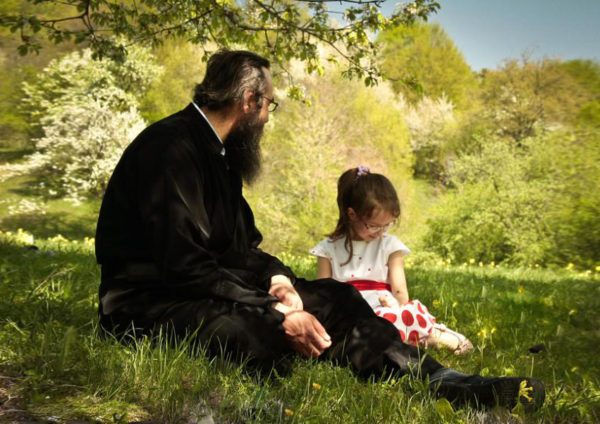Nothing helps foster humility like parenthood. New furniture may come out of the box from Ikea with a set of assembly instructions for clueless people like myself, but children do not come out of their mommy with a set of instructions. Too bad. Because sooner rather than later, all parents pull their hair in frustration or wring their hands with worry as they struggle to raise their children and keep them happy and safe. The unmarried and childless are often filled with wisdom and dispense confident advice about how to raise children, but actual parents soon discover that they have no real clue what they are doing. All of us parents are winging it, even if we have to hide this embarrassing fact from our children and give them the impression that we always know what to do, and are never frightened or at a loss. Like I said: parenthood fosters humility.
The world in which children are raised is a scary one, and dangerous. It is not just a matter of teaching children to stay away from the stove when mommy is cooking or not to talk to strangers. The world is filled with more subtle perils, things which can not only take away one’s health or life, but can also take away one’s soul. And these perils do not advertise themselves as perilous. They are usually wrapped in bright paper and shiny bows and advertised as indescribably wonderful by the media, but they are spiritually poisonous nonetheless. We cannot protect our children by shielding them from such dangers, locking them up in tall towers or hauling them off to live in monasteries at the age of six. What then can we do to protect them from harm, to help them grow up to know and love Jesus with all their hearts, and to seek first the Kingdom of God and His righteousness? How can we keep them on the path that leads to God?
There are, of course, no guarantees, and anyone who says differently is trying to sell you something. We can do everything within our power and pray our little parental hearts out, only to discover at the end of it that our children possess the same free will that we do, and can still decide to go their own way after all. It is, I suspect, the most heart-breaking thing there is. God understands this pain. We all are His children, and we have been going our own way for some time now. We can only do what we can do. The question is: what can we do? How can we keep our kids Christian? I suggest eight things.
First of all, make sure that you know Jesus yourself. You cannot give what you do not have, and if you do not know Jesus as your own Lord, God, and Saviour, you cannot lead your children to this knowledge. Knowing about Jesus is not sufficient. Knowing theology and being able to quote the Philokalia and the Fathers is not sufficient. Even being pious in church, attending services, lighting candles, and receiving Holy Communion is not sufficient if you do not also know Jesus and have a personal relationship with Him. Some of the Corinthians did all these things, and Paul still rebuked them, saying, “Some of you have no knowledge of God; I say this to your shame” (1 Cor. 15:34). By “knowing Jesus” I mean that He is the single most important thing in your life. If He is not, Orthodoxy is not your religion but your hobby, and like some of the Corinthians, you have no knowledge of God. If your life is not wrapped completely around the Son of God, you need to change this, and change it quickly. You can fool most of the people some of the time, and you can fool some of the people most of the time, but you can’t fool God any of the time, and you can’t fool your kids either. They will know if you really know Jesus or if you are just faking it.
Secondly, make prayer the main occupation of your life. This involves more than just “saying grace” at mealtime, and even more than having regular family prayers, though of course you should do this too. But it is important to pray so often that the kids sometimes can spy on you and catch you saying your prayers when you think they are not watching. This will convince them as nothing else will that you mean business with God and the religious stuff that you tell them is not just the sort of thing that parents tell children because they have to, but is real and true.
Thirdly, make the icon corner the heart of your home. Pray there as a family every day, and involve the children in this as much as they are able. In the case of little ones, this might be confined to kissing the icons, but everyone should be involved somehow, sharing prayers and lighting the candle. When the children are young, the prayer time must be kept short enough not to lose their attention. In a Sesame Street world where a maximum attention span seems to be set at about a minute and a half, this can be tricky. But we should still strive to find the balance between not praying enough to be real and to engage the heart and praying for so long that all the kids have zoned out.
Fourthly, look for opportunities for intercession. If the kids say that a friend of theirs at school is sick or has overdosed on drugs, we should take that as God’s call not to give a lecture, but to pray for that person and to gather the family at the icon corner for a brief time of prayer for the one in need. They will notice our choice of prayer over lecture and will secretly appreciate it. Lectures can be deemed hypocritical, but not prayer.
Fifthly, be honest in answering questions. I remember when my eldest daughter was very young. I was tucking her into bed one night when she asked me why we as Orthodox believed in the Resurrection of Christ. I responded by giving her the evidence—that the apostles said they saw Him and ate with Him after He had died and that they had no reason to lie; that even His enemies could not deny that the tomb was empty; and that St. Paul’s sudden conversion could not otherwise be explained. Her response was interesting: she said she was relieved by my words. She was afraid I was going to tell her that she had to believe it simply because it was in the Bible. I think that most children are like that, and that they will believe the Faith if they are given sound reasons to believe it. Simply saying, “You must believe because it is in the Bible”, or “You must believe because this is a dogma of our church” will not cut it. The day is long past when Faith was culturally unquestioned. Now everything is questioned, and we must be able to come up with some good answers.
Sixthly, be involved in your kids’ lives. Ask questions about their friends, what they are reading or watching on television, what they are watching online, where they are going after school, who they are talking to on the phone. Monitor where they go on the internet. Don’t come on like the Grand Inquisitor, as if you were interrogating them. Come on like someone who wants to know because he loves them. After all, you ask your spouse, “How was your day?” not in a spirit of interrogation, but because you care and are interested. Spread this same mantle of caring interest over your children also.
Seventh, rejoice in the Lord. Christ promised His disciples that they would have abundant life and joy (Jn. 10:10, 16:22), and we need to show this in our lives. This does not mean, I hasten to add, that we walk about in a state of euphoria and never experience sadness, dismay, or grief. That happy state cannot be sustained without extraordinary glow-with-uncreated-light sanctity, or possibly without heavy medication. But if our Faith does not result at least in some measure of joy in our lives, we will be less likely to convince anyone else that they should have it too. If our Christianity makes us miserable we will be poor salesmen for it. After all, there is plenty in the world to bring us down already without religion helping with the job and adding its two depressing bits.
Finally, pray for them, fervently, every day. We should not despair if there seem to be setbacks, and we should never give up. We love our children, but God loves them even more. He is not uninvolved in the struggle for their lives and souls. Let us offer our children to that love without ceasing, and ask God to watch over them, and work in their young hearts, and bring them safely to Himself.




















